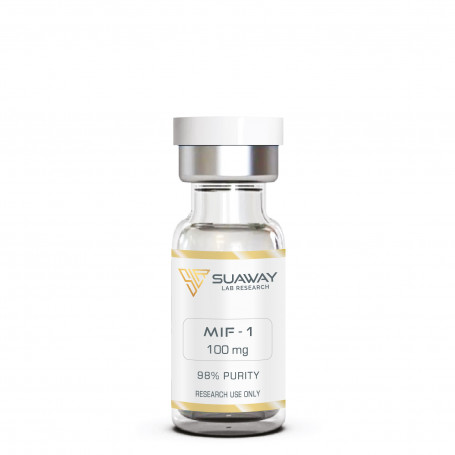MIF-1 - 100mg
- Neurotransmitter Modulation: Balances dopamine and serotonin systems, aiding in motor control and mood regulation.
- Enhanced Neuroplasticity: Improves learning and memory by promoting synaptic plasticity.
- Neuroprotection: Shields neurons from oxidative stress and inflammation.
- Neuroregeneration: Promotes repair and growth of neuronal cells, crucial for recovery from neurological injuries.
- Mood Improvement: Alleviates depressive symptoms through its interaction with serotonin and dopamine pathways.
- Cognitive Enhancement: Supports memory retention, attention, and problem-solving skills.
- Degenerative Disease Support: Counters the progression of symptoms in degenerative diseases.
Description
STRUCTURE
Sequence: Pro-Leu-Gly
Molecular Formula: C13H24N4O3
Molecular weight: 284,36 g/mol
CAS No: 2002-44-0
Peptide purity: Greater than 98%
Other details: No TFA Salt
DESCRITPION
Melanocyte-Inhibiting Factor 1 (MIF-1) is a peptide that has been the subject of extensive research due to its potential therapeutic effects on the central nervous system. MIF-1 is a tripeptide, composed of the amino acids L-proline, L-leucine, and L-glycine, arranged in the sequence Pro-Leu-Gly. Originally discovered for its ability to inhibit melanocyte-stimulating hormone, it has since been identified to have broader physiological roles. MIF-1 has demonstrated notable effects on mood regulation, cognitive function, and neuroprotection, making it a candidate for addressing various neurological and psychiatric conditions.
Effects on the Nervous System
MIF-1 exerts several significant effects on the nervous system, particularly in modulating neurotransmitter activities. Research indicates that MIF-1 can influence the dopaminergic and serotonergic systems. By modulating dopamine receptors, MIF-1 helps balance dopamine levels, which is crucial for motor control and emotional regulation. Additionally, its interaction with the serotonin system may contribute to its potential antidepressant effects. These modulations help in alleviating symptoms of mood disorders and enhancing overall mental well-being.
Effects on the Brain
In the brain, MIF-1 has shown promising results in enhancing neuroplasticity and protecting neuronal health. Studies suggest that MIF-1 can cross the blood-brain barrier, allowing it to directly interact with brain tissues. It has been observed to enhance synaptic plasticity, which is vital for learning and memory processes. Moreover, MIF-1’s neuroprotective properties help shield neurons from damage caused by oxidative stress and inflammation. This makes it a valuable peptide for promoting brain health and preventing neurodegeneration.
Other Effects on Neuroregeneration, Depression, and Cognitive Enhancement
MIF-1’s role in neuroregeneration is particularly noteworthy. It promotes the repair and growth of neuronal cells, which is essential for recovering from neurological injuries and diseases. This regenerative capacity is crucial for patients with degenerative conditions like Parkinson’s and Alzheimer’s disease. In terms of depression and mood regulation, MIF-1’s interaction with serotonin and dopamine pathways has shown to improve mood and alleviate depressive symptoms. Cognitive enhancement is another area where MIF-1 excels. By boosting neuroplasticity and protecting neurons, MIF-1 supports better cognitive functions, such as memory retention, attention, and problem-solving skills.
Therapeutic Potential in Degenerative Diseases
MIF-1’s multifaceted effects make it a promising therapeutic agent for degenerative diseases. In Parkinson’s disease, for example, MIF-1’s ability to modulate dopamine receptors and enhance neuroprotection can help mitigate motor dysfunction and neuronal loss. For Alzheimer’s disease, MIF-1’s neuroregenerative and anti-inflammatory properties can slow the progression of cognitive decline and improve quality of life. Additionally, MIF-1’s mood-regulating effects can benefit patients suffering from the psychological impacts of these conditions, providing a holistic approach to treatment.
Conclusion
In conclusion, MIF-1 is a peptide with significant potential for various neurological and psychiatric conditions. Its ability to modulate neurotransmitter systems, enhance neuroplasticity, promote neuroregeneration, and protect neurons from damage positions it as a valuable tool for research. Further clinical studies are essential to fully understand its mechanisms and optimize its use in treating conditions such as Parkinson's disease, Alzheimer's disease, depression, and cognitive disorders.
REFERENCES
R.S. Khan et al., "Brain Activation by Peptide Pro-Leu-Gly-NH(2) (MIF-1)" [PubMed]
J.M. Lee et al., "Cyclo(Leu-Gly) has opposite effects on D-2 dopamine receptors in different brain areas" [PubMed]
M. Gonce et al., "Physiological trials with MIF-I in Parkinson's disease" [PubMed]
A. Carolei et al., "MIF (melanocyte-stimulating hormone release-inhibiting factor) and Parkinson's disease" [PubMed]
L.G. Miller et al., "MIF-1 and Tyr-MIF-1 augment GABA-stimulated benzodiazepine receptor binding" [PubMed]
DISCLAIMER
This product is intendend for lab research and development use only. These studies are performed outside of the body. This product is not medicines or drugs and has not been approved by the FDA or EMA to prevent, treat or cure any medical condition, ailment or disease. Bodily introduction of any kind into humans or animals is strictly forbidden by law. This product should only be handled by licensed, qualified professionals.
All product information provided on this website is for informational and educational purposes only.


